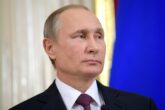July 22, 2014
Putin’s South American Trip Hides Russia’s Strategic Weaknesses
Although Russian President Vladimir Putin’s visit to South America earlier this month was overshadowed by events in Ukraine and the Middle East, it did garner considerable attention in the South American and Russian media. Even in Washington, commentators saw Putin as seeking to circumvent the Western opposition to his policies in Ukraine as well as retaliate for U.S. involvement in Moscow’s neighboring states with a tit-for-tat display of influence in Washington’s strategic backyard.
Putin began his visit in Cuba on July 11, where he finalized plans to eliminate 90 percent of Cuba’s Cold War-era debt to Russia—more than $30 billion out of $35 billion—and convert the remainder to a special joint development fund to support new Russian-Cuban projects. After a brief stop in Nicaragua, he then traveled to Argentina, where he oversaw a nuclear energy cooperation agreement and other deals. In Brazil, his last stop, he watched the World Cup soccer final, signed new economic measures and attended the sixth annual BRICS summit—later joined by other South American leaders—before flying home on July 16.
But a false report that Russia planned to restore its electronics listening post at Lourdes in Cuba, like earlier U.S. fears that Russia planned to build permanent military bases in the Western Hemisphere, reflects unrealistic expectations of Moscow’s capabilities and willingness to confront Washington in a region of peripheral concern to most Russian policymakers. Putin has since indicated that Russia has no plans to relaunch Lourdes as a signals intelligence center, while the government has clarified that the Russian navy only wants access to temporary support centers and not permanent bases in the hemisphere.
More from CNAS
-
Trump ‘Humiliated’ as Putin Sends Clear Message That He Doesn’t Care About US
"Putin is not playing ball." Putin's Palm Sunday attack on Sumy is "embarrassing for the White House" as it comes just days after Steve Witkoff met with the Kremlin, says adju...
By Jim Townsend
-
The Hidden Past and Uncertain Future of the U.S. and Ukraine with Celeste Wallander
Under the Trump administration, U.S. support for Ukraine is no longer guaranteed. President Trump's pause on aid and intelligence to Ukraine in March may have been brief, but ...
By Andrea Kendall-Taylor, Jim Townsend & Celeste Wallander
-
Is Russia Under Pressure?
Since 2014, the United States and its allies have provided increasing military support to Ukraine while imposing more and tougher economic sanctions on Russia, especially sinc...
By Jeffrey Edmonds
-
Sharper: Russia and the Axis of Upheaval
Russia’s 2022 invasion of Ukraine served as a dramatic catalyst for strengthening the global axis of upheaval. To sustain its war effort, Russia has imported Iranian weapons a...
By Charles Horn




